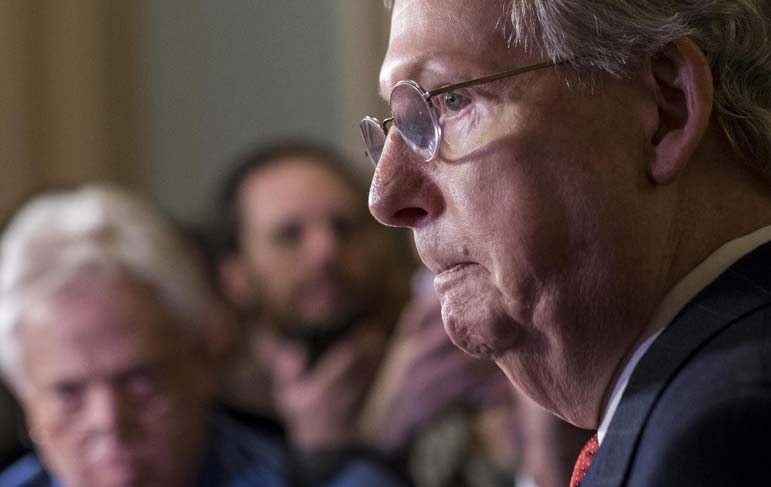 Melina Mara for The Washington Post
Melina Mara for The Washington Post
The ascension of Donald Trump was supposed to change everything in the GOP. As it happens, perhaps one very important thing hasn't: The Republicans may well still be The Stupid Party.
That ObamaCare repeal has one or maybe two feet in the grave, depending on how you're counting, is testament to jaw-dropping disarray and bad faith.
On the cusp of a historic failure, the party has begun the finger-pointing, and it's hard to argue with any of it. The establishment is right that Trump is incapable of true legislative leadership. The Trumpists are right that the establishment is ineffectual. Conservatives are right that moderates don't really want to repeal ObamaCare, whatever they've said in the past. And pragmatists are right that a few conservatives are beholden to a self-defeating purity.
The Republican members of the world's greatest deliberative body aren't covering themselves in glory. Susan Collins of Maine and Rand Paul of Kentucky have always been no's, leaving no margin for error. Mike Lee of Utah and Jerry Moran of Kansas are additional no's on the current repeal-and-replace bill, while Shelley Moore Capito of West Virginia and Lisa Murkowski of Alaska have joined Collins as no's on repeal-only.
At least Collins, an ideological outlier, has been consistent. She voted against the repeal-only bill in 2015, and the GOP leadership never thought she was gettable.
The same can't be said of her cohorts. Capito and Murkowski both voted for the repeal-only bill a year and a half ago. The only plausible reason they've switched now is that they knew the bill would be safely relegated to oblivion by an Obama veto, whereas Trump will now sign any legislation into law.
Then there is another tranche of Republicans, like Rob Portman, who are nervous fence-sitters. The Ohio senator doesn't have to appear on a ballot again until 2022, yet gives every indication of quailing at taking a tough vote.
The former Office of Management and Budget director's calling card is fiscal conservatism, yet he blanches at the prospect of scaling back Medicaid. He is a wonk, yet appears to be outsourcing his policy thinking to Gov. John Kasich.
For Rand Paul, clearly, a perhaps once-in-generation opportunity to significantly reform two entitlement programs isn't as important as scoring cheap points against his colleagues in the cause of getting as many cable hits as possible. For a purist, he can't keep his story straight. At first, he insisted repeal had to be accompanied by replace. Now, he's back to saying just repeal. Whatever it is, Paul will find a reason to oppose.
Lee is a thoughtful, public-interested conservative who isn't a showboater. He has an outsize influence on the prospects of the bill because he's one of the few Republicans willing to be the decisive vote against it.
If he's opposed, other senators can slipstream behind him and declare against, as well. This is what happened this week when Moran joined Lee in public opposition.
This is why it's particularly important that the Utah senator keep the big picture in view; torpedoing the entire effort over a relatively technical question about the insurance risk pools - Lee's current posture - would be a disastrous mistake.
It's not just senators who are falling down. The repeal effort hasn't had meaningful leadership or air cover from the top.
Upon taking office, President Trump didn't have an agenda, only slogans and attitudes. No one will ever accuse him of sweating the details. The president has very little idea what's in the health-care bill, and doesn't particularly care. This prevents him from helpfully engaging in detailed negotiations, and he hasn't made a public case for the bill except in tweets and at the highest level of generality.
He tends to be all over the map - one day passage of the House bill is a marvelous accomplishment to be celebrated at the White House; the next, the very same bill is "mean."
Repeal was never going to be easy. The law has created facts on the ground that are inherently difficult to undo. Mitch McConnell has 52 Republican senators, whereas Harry Reid had 60 - an enormous difference that tends to be unappreciated. But Reid held all his members.
At the end of the day, the most important difference between the parties on health care may be that the Democrats had a vision that they were thoroughly committed to and were astonishingly courageous in effecting.
No one had more to lose from sticking with the forced march toward passage of ObamaCare than Nancy Pelosi, and yet no one was as devoted to the cause.
Like the Democrats in 2009, Republicans have a historic opportunity that will quickly vanish unless it is seized. A majority is a terrible thing to waste. Six months in, Republicans are giving every indication that is exactly what they might do, to their everlasting disgrace.
Comment by clicking here.


 Contact The Editor
Contact The Editor
 Articles By This Author
Articles By This Author